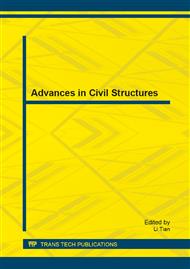p.1601
p.1605
p.1610
p.1616
p.1620
p.1625
p.1629
p.1637
p.1641
Research on Carbonation Life Prediction Model of Recycled Concrete Structures
Abstract:
Based on available achievements on carbonation life prediction model of recycled concrete structures at home and abroad, suggested values of recycled coarse aggregate influence coefficient in the practical mathematics model of recycled concrete carbonation depth was put forward through the comparative analysis. Tensile stress influence coefficient in the empirical model of recycled concrete carbonation depth was revised by mathematical regression analysis. The sensitivity analysis for empirical model was undertaken. Results show that the influencing sequence of the carbonation life impact factors of recycled concrete structures is: cover thickness, recycled concrete strength, relative humidity, environment temperature, tensile stress ratio, CO2 concentration.
Info:
Periodical:
Pages:
1620-1624
Citation:
Online since:
August 2013
Authors:
Price:
Сopyright:
© 2013 Trans Tech Publications Ltd. All Rights Reserved
Share:
Citation:


